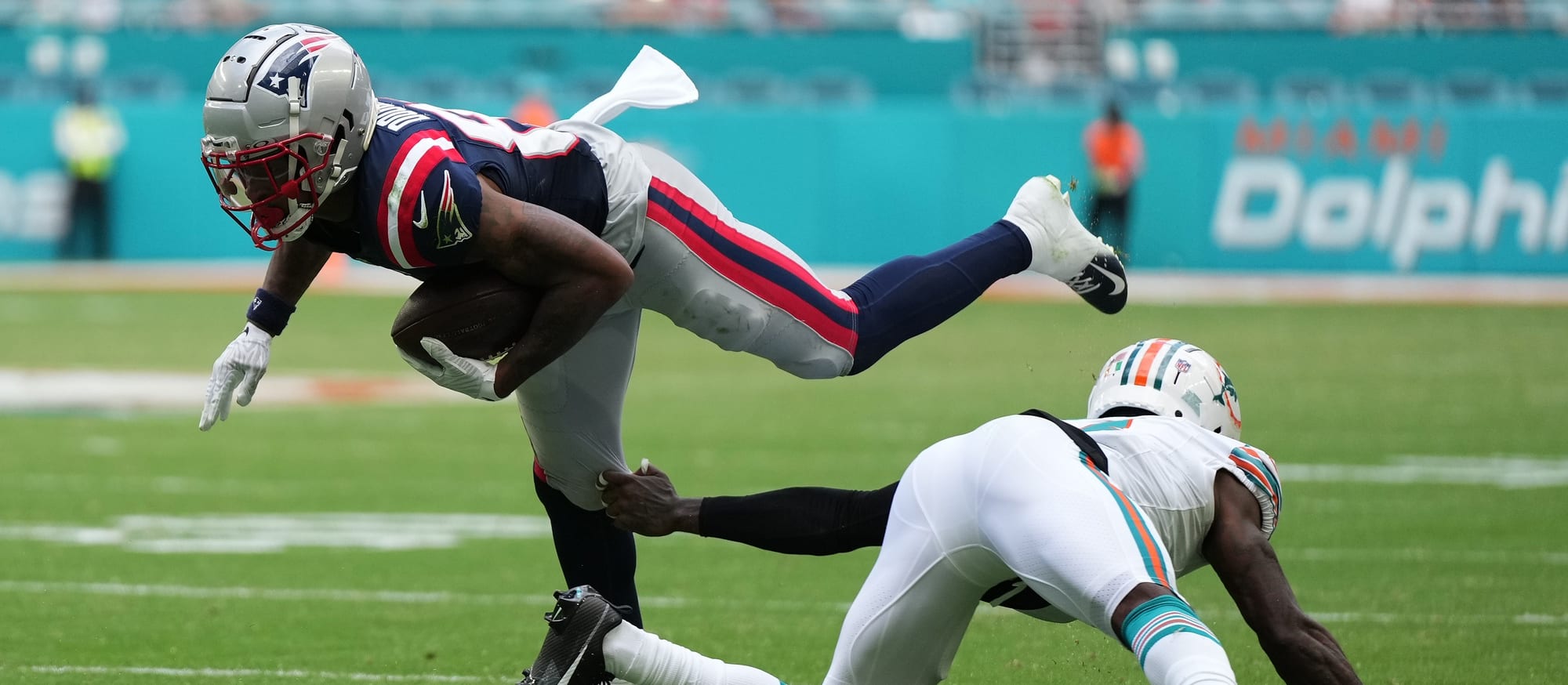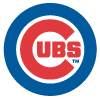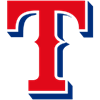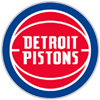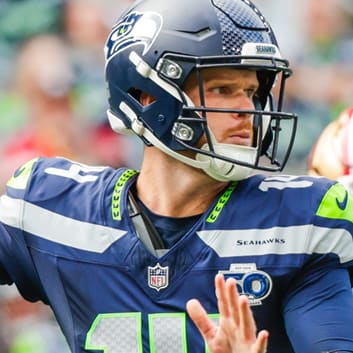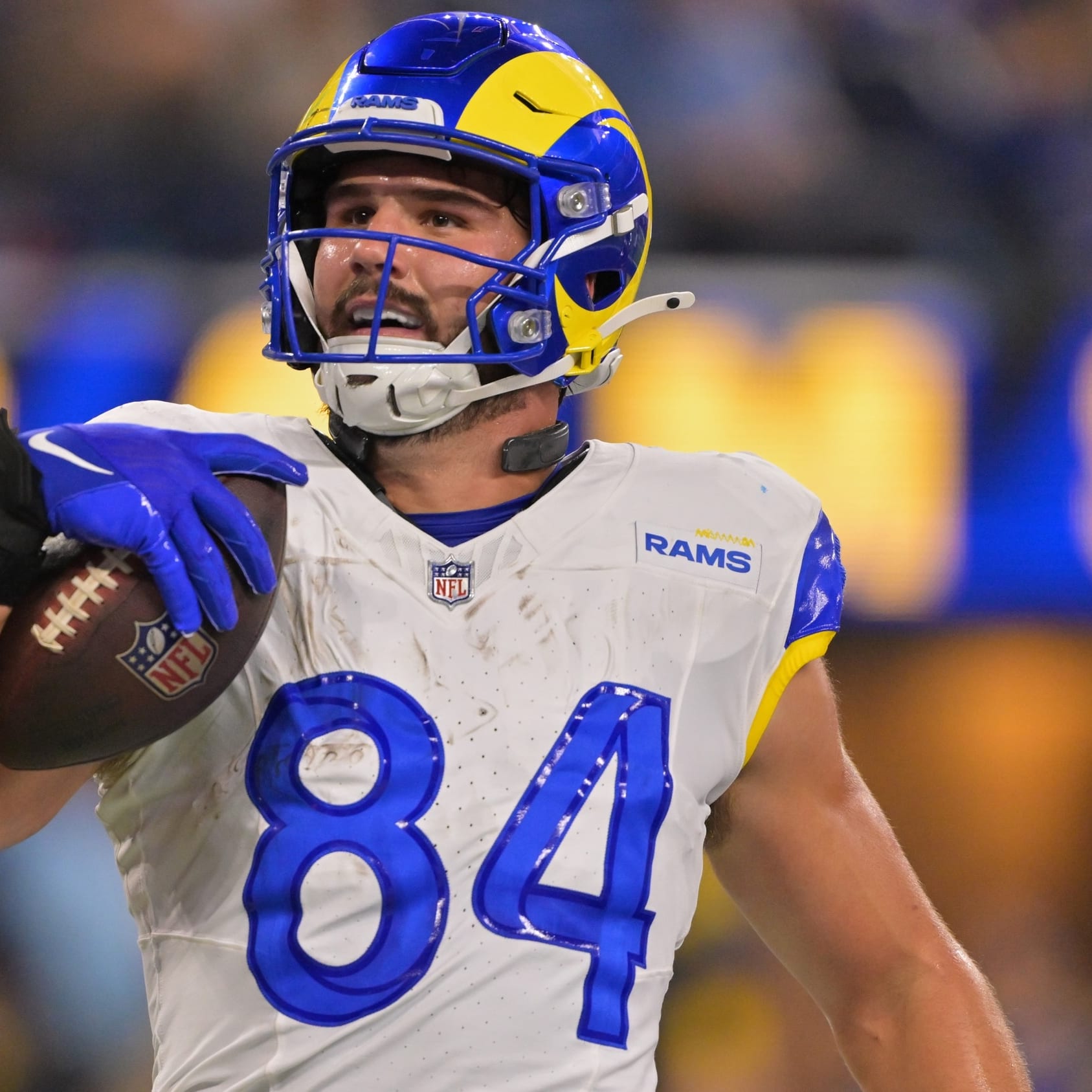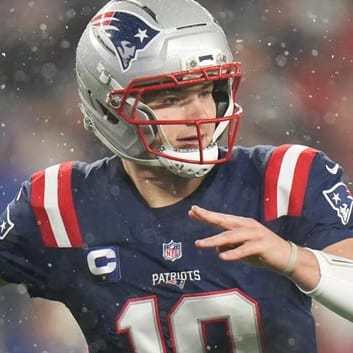The Wide Receiver series will be in multiple installments like the running backs. This first one (here) looked at Arizona, Baltimore and Buffalo, while the second one (here) looked at Cincinnati, Denver and Green Bay. This third one will look at Indianapolis, the Chargers, Minnesota and New England.
The competitions are listed alphabetically for team location, and the players are listed in order of years in the NFL. A general verdict is issued at the end of each blurb.
Alec Pierce vs. Josh Downs vs. Adonai Mitchell, IND
This competition was complicated by the high-ankle sprain suffered by Downs on Wednesday, which has his availability for Week 1 in some question now. When healthy Downs' role is settled – he's the top slot receiver for Indianapolis and he looks like a very good one at that. In general, we should plan on Indianapolis' top two wideouts this year to be Downs and Michael Pittman (the latter the WR1 of course).
Mitchell and especially Pierce don't profile as well in the slot as they do from the boundary, so rather than one of those two benefiting from Downs' slot reps at any point it would likely be a lot of work for rookie fifth-round pick Anthony Gould, a speedy (4.39-second 40) slot specialist (5-foot-8, 174 pounds). While Mitchell should see more slot work than Pierce, it's mostly on the boundary where Mitchell or Pierce need to earn their viable reps. That's with Pittman almost
The Wide Receiver series will be in multiple installments like the running backs. This first one (here) looked at Arizona, Baltimore and Buffalo, while the second one (here) looked at Cincinnati, Denver and Green Bay. This third one will look at Indianapolis, the Chargers, Minnesota and New England.
The competitions are listed alphabetically for team location, and the players are listed in order of years in the NFL. A general verdict is issued at the end of each blurb.
Alec Pierce vs. Josh Downs vs. Adonai Mitchell, IND
This competition was complicated by the high-ankle sprain suffered by Downs on Wednesday, which has his availability for Week 1 in some question now. When healthy Downs' role is settled – he's the top slot receiver for Indianapolis and he looks like a very good one at that. In general, we should plan on Indianapolis' top two wideouts this year to be Downs and Michael Pittman (the latter the WR1 of course).
Mitchell and especially Pierce don't profile as well in the slot as they do from the boundary, so rather than one of those two benefiting from Downs' slot reps at any point it would likely be a lot of work for rookie fifth-round pick Anthony Gould, a speedy (4.39-second 40) slot specialist (5-foot-8, 174 pounds). While Mitchell should see more slot work than Pierce, it's mostly on the boundary where Mitchell or Pierce need to earn their viable reps. That's with Pittman almost always claiming one of the two, generally leaving Mitchell and Pierce to fight over the remaining one.
Mitchell will almost certainly surpass Pierce at some point, but pushing Pierce aside entirely could prove difficult, especially in 2024. As much as Mitchell is the better prospect of the two, Pierce was a quality second-round prospect himself out of Cincinnati in 2022. As a downfield and jumpball target Pierce might be able to match or exceed the utility of Mitchell, because Mitchell's 4.34-second 40 at 6-foot-2, 205 pounds is roughly the same expressed vertical threat as Pierce's 4.42-second 40 at 6-foot-3, 211 pounds, with a bigger wingspan than Mitchell. Even while playing with bad quarterbacks for the vast majority of his first two years – Matt Ryan, Sam Ehlinger, Nick Foles and Gardner Minshew – Pierce averaged 7.74 yards per target while drawing 143 targets on 1,732 snaps. Pierce is likely no worse than an average starting boundary wideout, and one particularly good at drawing the safety to clear out space for Pittman and Downs.
Mitchell's advantage over Pierce is the threat posed from scrimmage, especially as a YAC target on the underneath. Mitchell will probably never be fluent in running over the middle from the slot, but he's more threatening than Pierce from shallow depths. While Pierce is generally sound on the boundary and particularly good downfield, the lag in Pierce's target rate is primarily caused by a deficiency in underneath targets.
Mitchell and Pierce are probably set for a rotation of some sort, probably mostly even in general but decided on the basis of situation. If the Colts need someone to catch a pass underneath, Mitchell qualifies and Pierce doesn't. If the Colts need someone to make a contested catches 30 yards downfield or/and they need decoy functions to occupy the safety, then Pierce might be higher on that particular depth chart.
Verdict: Pittman and Downs are likely to be the two lead targets for the Colts in 2024. In three-wide sets Pittman would be on the boundary and Downs would generally be in the slot. This would in most cases leave only one remaining rep to split between Mitchell and Pierce in three-wide situations. The Colts will probably call some amount of four-wide and trips to create multiple slot looks at some points of the season, but if both Mitchell and Pierce are healthy it will likely prove difficult for one to decisively push aside the other in 2024.
Chark vs. J. Palmer vs. Q. Johnston vs. L. McConkey, LAC
We pretty much know that the starting Chargers loadout at wide receiver will be Chark (X), Palmer (flanker or slot) and McConkey (slot or flanker). The question of how they will all fit together, and how well they'll all work with Justin Herbert is more unsettled, particularly with Herbert (foot) missing nearly all of training camp and with both McConkey (leg) and Palmer (knee) being limited at various points. Chark, of course, is new to the team after playing previously with Carolina, Detroit and Jacksonville.
Due to prior familiarity the missed practice time for Herbert might make Palmer the best bet for a fast start, even though McConkey is expected to eventually overtake Palmer in the rotation. Palmer can line up inside or outside, like McConkey, but for the most part the expectation is that Palmer will play the flanker spot and McConkey will play the slot. Both Palmer and McConkey should draw (and convert) targets at a healthy rate, especially because they should be running shallower routes than Chark, who figures to get stuck with most of the difficult downfield throws. Chark is also liable to get stuck with some decoy tasks to draw safeties away from Palmer and McConkey underneath.
As much as Chark is new to Herbert and as much as Chark is limited to the sideline and downfield, Chark could still be an instant factor with Herbert due to Chark's speed and downfield prowess. Great as Keenan Allen and Mike Williams were for Herbert, the Chargers have literally never given Herbert a legitimate downfield threat. With Herbert's cannon arm and Chark's 4.34 speed, the Chargers might be able to spark some big plays with Chark whenever he gets left in single coverage.
Johnston is something of a wildcard as the likely WR4 – a recent former first-round pick, but one who struggled memorably badly as a rookie. Johnston struggled to separate from corners the way he did at TCU – likely because he's too slow to separate on the same play designs as he did in college – and when forced to make contested catches Johnston showed little or no ability to hold ground at the point of attack. The Chargers will likely keep Johnston's functions limited to designed touches and other ways to help him establish some balance at the pro level, hoping in the meantime that Johnston develops his ability to make contested catches. Johnston will likely be the first man up if anyone gets hurt, and durability is a significant concern for all of Palmer, McConkey and Chark.
Verdict: Injuries to Herbert (foot), McConkey (leg) and Palmer (knee) have complicated this projection. In the long term McConkey projects as the eventual WR1 of this group, but between McConkey and Herbert missing practice it might not be possible for McConkey to be as prepared to work with Herbert as the veteran Palmer. Whatever their specific hierarchy as a target rotation, the Chargers should usually start McConkey in the slot with Palmer and Chark on the boundary. McConkey and Palmer can alternate between the slot and flanker spots easily, but Chark will almost entirely stay on the boundary as the X wideout, or occasionally the flanker. Johnston will likely be the WR4, but the first up if any of the first three is limited or unavailable for a rep, and all of Chark, Palmer and McConkey have shown the ability to get nicked up.
Brandon Powell vs. Jalen Nailor, MIN
The Vikings might be throwing the ball often in 2024, which should mean a heavy workload for Justin Jefferson, Jordan Addison and eventually T.J. Hockenson (knee). Given Hockenson's indefinitely uncertain status, though, the Vikings might find themselves utilizing their WR3 more than most teams in 2024.
The incumbent or/and de facto WR3 for Minnesota is Powell, though that's most a by-default result of the momentum Powell gained last year, when Nailor was mostly injured. Injuries have been a rather constant issue for Nailor going back to his days at Michigan State – it's largely why Nailor fell to the sixth round – but when healthy Nailor has hinted at real from-scrimmage ability at wide receiver in the NFL.
Whereas Nailor grades as a reasonably viable NFL prospect, Powell does not. Indeed, Powell is small (5-foot-8, 181 pounds), slow (4.59-second pro day 40), and patently unproductive both at the college and NFL levels. Powell's 'good' 2023 season was not actually good, he was sort of just the last guy hanging around for the easy targets that come with the defensive attention drawn by Jefferson, Addison and Hockenson. Powell generated just 44 targets on 390 snaps, catching 29 for 324 yards and one touchdown (65.9 percent catch rate, 7.4 YPT), which is not actually good. The career high in receiving yardage for Powell at Florida was just 406 yards in 11 games as a senior. Brutal. Before last year Powell was one of those guys whose roster spot was justified as a return specialist, even though Powell also isn't a good returner (21.0 yards per KR, 8.8 yards per PR).
Nailor wasn't exactly a blue-chip prospect out of Michigan State, but he was much more productive than Powell was in college. Nailor (62) out-targeted Jayden Reed (57) in 2021, and even produced more yardage (515) than Reed (407) at a similar YPT (8.3 versus 7.3 for Reed). Although Reed became the more productive player in 2022, Reed's second season with Michigan State, Nailor remained productive in his own right. Whereas Powell's athletic testing is poor, Nailor (5-foot-11, 186 pounds) did decently well at the combine with a 4.50-second 40, 38-inch vertical and 128-inch broad jump.
Verdict: Powell might have some traction as a slot specialist, especially if Jefferson and Addison are both present. Just the same, Nailor has an easy talent advantage over Powell and Nailor probably isn't a zero in the slot. Jefferson and Addison are plenty comfortable running from the slot, moreover, so even if Nailor can't beat Powell inside the Vikings might still eventually settle on an optimal loadout of Nailor on the boundary with Jefferson or Addison in the slot. While Nailor isn't guaranteed to be useful, Powell is nearly guaranteed to be close to useless.
K. Bourne vs. D. Douglas vs. J. Polk vs. J. Baker, NE
Kayshon Boutte and Tyquan Thornton are also hanging around and could make the team as the WR5/WR6, but this blurb will assume the named wideouts – Bourne, Douglas, Polk and Baker – are the top four for New England at the moment.
Polk (second round, 37th overall) and Baker (fourth round, 110th overall) are promising rookie additions who both figure to focus on the boundary reps, if only because Douglas was so good in the slot as a rookie and through camp in 2024. Particularly given that Douglas (5-foot-8, 179 pounds) is unlikely to line up much outside, it's crucial that the Patriots give Douglas an almost entire monopoly on the three-wide slot reps to maximize his production.
Bourne (knee) is the veteran of the group, but it's not clear how early the 29-year-old might be able to contribute after suffering a season-ending ACL injury in Week 8 of 2023 (10/29). Bourne had been quite productive prior to then, especially in 2021 and 2023. If Bourne can regain his pre-injury per-snap production rates then he might establish himself as the WR1 in New England, presumably operating primarily from the flanker spot but often the slot when Douglas isn't in the way.
Polk is the favorite to eventually emerge as the lead boundary wideout over Bourne and that could occur as early as this year, but there's also a chance the two sort of cancel each other out due to their overlap. Baker is probably more of a downfield target than Bourne or Polk, but Baker's chain-moving ability probably lags behind those two. Both Polk and Baker have drawn good reviews for their play in training camp.
Verdict: JuJu Smith-Schuster is out and Tyquan Thornton might be next, which would leave the identified four and maybe Boutte to fight for reps in an unproven rotation. Boutte could be an eventual factor, but he's probably best thought of as a wildcard while Douglas, Polk, Bourne and Baker hold most of the real estate in the top four. Douglas might not log many boundary snaps but is so dominant as a slot presence that he should get almost every opportunity there in three-wide and certainly four-wide sets. Polk and Baker are the best candidates to log 'X' snaps, while Bourne will probably work mostly between flanker and the slot. Douglas will likely stand out in the slot to the point that he might finish the year as the WR1 of this group, while Polk projects as the immediate or eventual lead guy on the boundary, be it the X or flanker spot. As much as Douglas and Polk are in the hunt to be New England's WR1 in 2024, Bourne showed the ability to claim that role prior to his injury.


